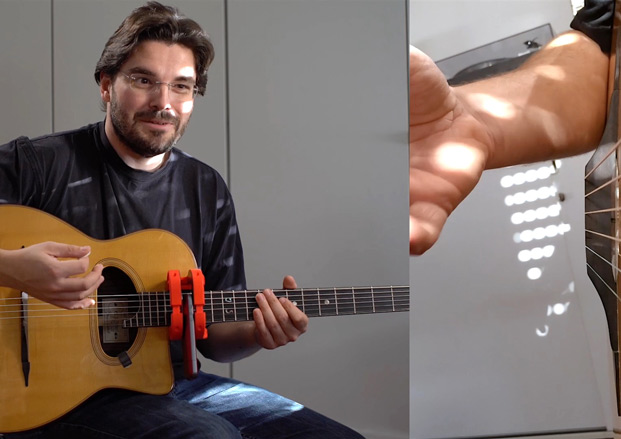Joscho Stephan: Django vs. Yngwie Arpeggios
A fascinating study in two iconic styles of arpeggio playing.

In this clip from our recent interview with the amazing Joscho Stephan, the jazz master offers a fascinating study in two iconic styles of arpeggio playing.
In the left corner, weighing in at nearly 85 years of historic influence, is the classic "Gypsy" style of Django Reinhardt. With its signature flexed wrist and wide, swinging downstroke attack, the Django style is instantly recognizable in its mechanical ingredients, even among non-aficionados. And it represented a watershed moment in 20th-century guitar technique, by providing the speed and power necessary to allow the guitar to step the from the back row of the bandstand into the limelight of modern lead playing.
In the right corner we have the turbocharged sweep approach of Yngwie Malmsteen. Malmsteen's influence in popularizing the concept of connected pickstrokes for rapid arpeggio playing across the strings is felt every time an aspiring 21st-century rock guitarist heads to YouTube and types "sweep arpeggios" into the search box. And yet, when viewed in slow-motion, the similarities between the Malmsteen and Django approaches are obvious.
Both systems rely on the downward angled, or "downward pickslanting" pick attack, which allows the pick to flow over the strings in the ascending direction. And because of this, both systems run into a roadblock when faced with descending arpeggio passages where the pick can't flow so easily. The Django solution is multiple downstrokes, with a rotational lift in between to reach the next lower string. The Malmsteen solution is counter-intuitive: double upstrokes, separated by a pull-off.
What the Django approach offers in power and clarity, the Malmsteen approach offers in speed and fluidity. More fascinating is how Stephan developed them. Was he a dedicated transcriber of both Gypsy and neoclassical metal masters? Hardly. As Stephan relates, the Malmsteen approach was simply a happy accident, stumbled across by relentlessly experimenting with different right hand approaches.
Time and again in our interviews with elite players, what's amazing is not so much that they can play impossible things, but rather the impossible ease with which they can discover easy ways of doing so without anyone else pointing the way.
Troy Grady is the creator of Cracking the Code, a documentary series with a unique analytical approach to understanding guitar technique. Melding archival footage, in-depth interviews, painstakingly crafted animation and custom soundtrack, it’s a pop-science investigation of an age-old mystery: Why are some players seemingly super-powered?
All the latest guitar news, interviews, lessons, reviews, deals and more, direct to your inbox!
Troy Grady is the creator of Cracking the Code, a documentary series with a unique analytical approach to understanding guitar technique. Melding archival footage, in-depth interviews, painstakingly crafted animation and custom soundtrack, it’s a pop-science investigation of an age-old mystery: Why are some players seemingly super-powered?
